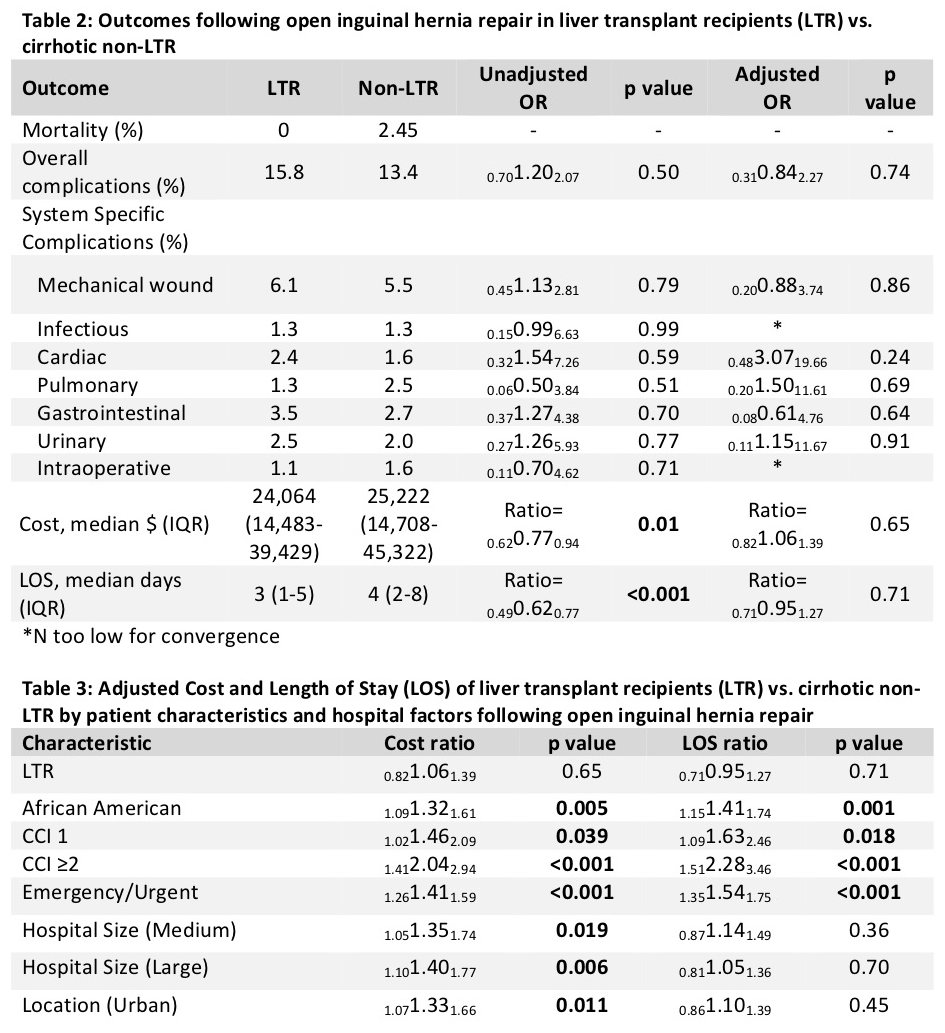Outcomes Following Open Inguinal Hernia Repair in Liver Transplant versus Cirrhotic Patients
Johns Hopkins, Baltimore, MD
Meeting: 2019 American Transplant Congress
Abstract number: B306
Keywords: Liver, Liver cirrhosis, Liver transplantation, Outcome
Session Information
Session Name: Poster Session B: Liver Retransplantation and Other Complications
Session Type: Poster Session
Date: Sunday, June 2, 2019
Session Time: 6:00pm-7:00pm
 Presentation Time: 6:00pm-7:00pm
Presentation Time: 6:00pm-7:00pm
Location: Hall C & D
*Purpose: Patients with cirrhosis are at an increased risk for post-operative complications after open inguinal hernia repair (OIHR). Conversely, liver transplant recipients (LTR) may have better outcomes, given reversal of liver failure pathophysiology. We sought to determine the risk of mortality, complications, length-of-stay (LOS) and cost associated with OIHR in LTR as compared to cirrhotic non-LTR.
*Methods: From the National Inpatient Sample (NIS), using ICD-9 codes, we found 83 LTR and 764 cirrhotic non-LTR who underwent OIHR between 2002 and 2014. We used logistic, negative binomial and multiple linear regression models to compare mortality risk, post-operative complications, and hospitalization LOS and cost associated with OIHR in LTR versus cirrhotic non-LTR. Models were adjusted for patient demographic and clinical characteristics and hospital factors.
*Results: LTR were younger (59 vs 61, p<0.001), had lower Charlson Comorbidity Index (CCI) scores (49.6% with 0 points vs 66% with score ≥2 points), were privately insured (39.8% vs 24.6%, p=0.006), and more often had surgery at larger hospitals (82.2% vs 65.2%, p=0.024) and teaching hospitals (80.6% vs 47.9%, p<0.001).
While there were no post-operative deaths among LTR, there were 19 (2.5%) deaths among cirrhotic non-LTR. LTR had a similar risk of overall complications (adjusted odds ratio aOR=0.310.842.26, p=0.73). LTR had decreased LOS (ratio=0.490.620.77, p<0.001) and lower cost (ratio=0.620.770.94, p=0.011), however, after adjusting for patient and hospital factors, these findings were no longer significant (ratio=0.710.951.27, p=0.72, and ratio=0.821.061.39, p=0.65). Higher CCIs were associated with increased LOS (CCI of 1 ratio=1.091.632.46, p=0.018 and CCI ≥2 1.502.283.46, p<0.001) and cost (CCI of 1 ratio=1.021.462.09, p=0.038 and CCI ≥2 1.412.042.94, p<0.001).
*Conclusions: OIHR can be performed safely in LTR and with reduced healthcare costs as compared to cirrhotic non-LTR. Increased LOS and cost after OIHR in cirrhotic non-LTR were driven by medical comorbidity. Therefore, in select patients with cirrhosis with little comorbidity and in an elective setting, OIHR might be a safe and productive utilization of resources.
To cite this abstract in AMA style:
Siegel N, Kernodle A, DiBrito S, Ishaque T, Segev D, Garonzik-Wang J. Outcomes Following Open Inguinal Hernia Repair in Liver Transplant versus Cirrhotic Patients [abstract]. Am J Transplant. 2019; 19 (suppl 3). https://atcmeetingabstracts.com/abstract/outcomes-following-open-inguinal-hernia-repair-in-liver-transplant-versus-cirrhotic-patients/. Accessed June 30, 2025.« Back to 2019 American Transplant Congress


